鲁教版(五四制)英语八年级上册 Unit 4 An old man tried to move the mountains 知识点讲义
文档属性
| 名称 | 鲁教版(五四制)英语八年级上册 Unit 4 An old man tried to move the mountains 知识点讲义 |
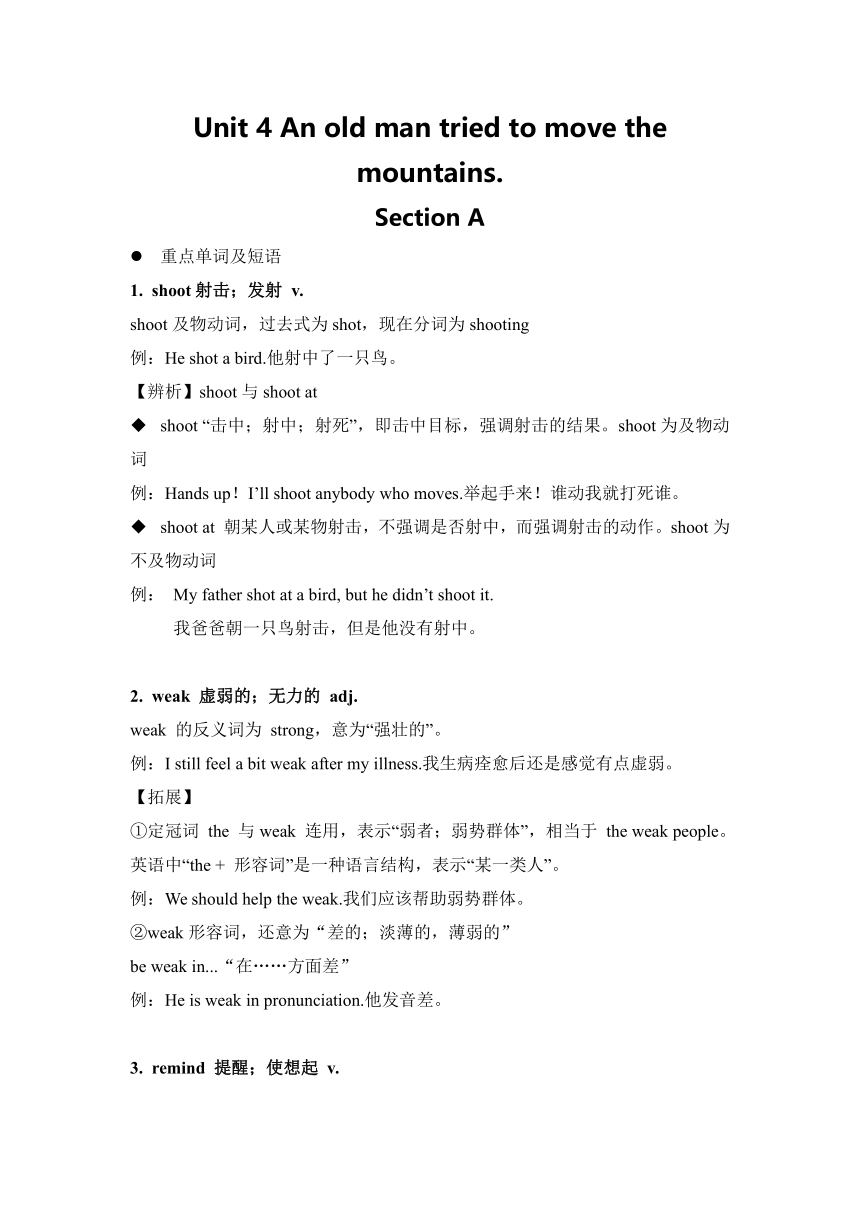
|
|
| 格式 | docx | ||
| 文件大小 | 32.9KB | ||
| 资源类型 | 教案 | ||
| 版本资源 | 鲁教版 | ||
| 科目 | 英语 | ||
| 更新时间 | 2022-09-16 17:45:58 | ||
图片预览

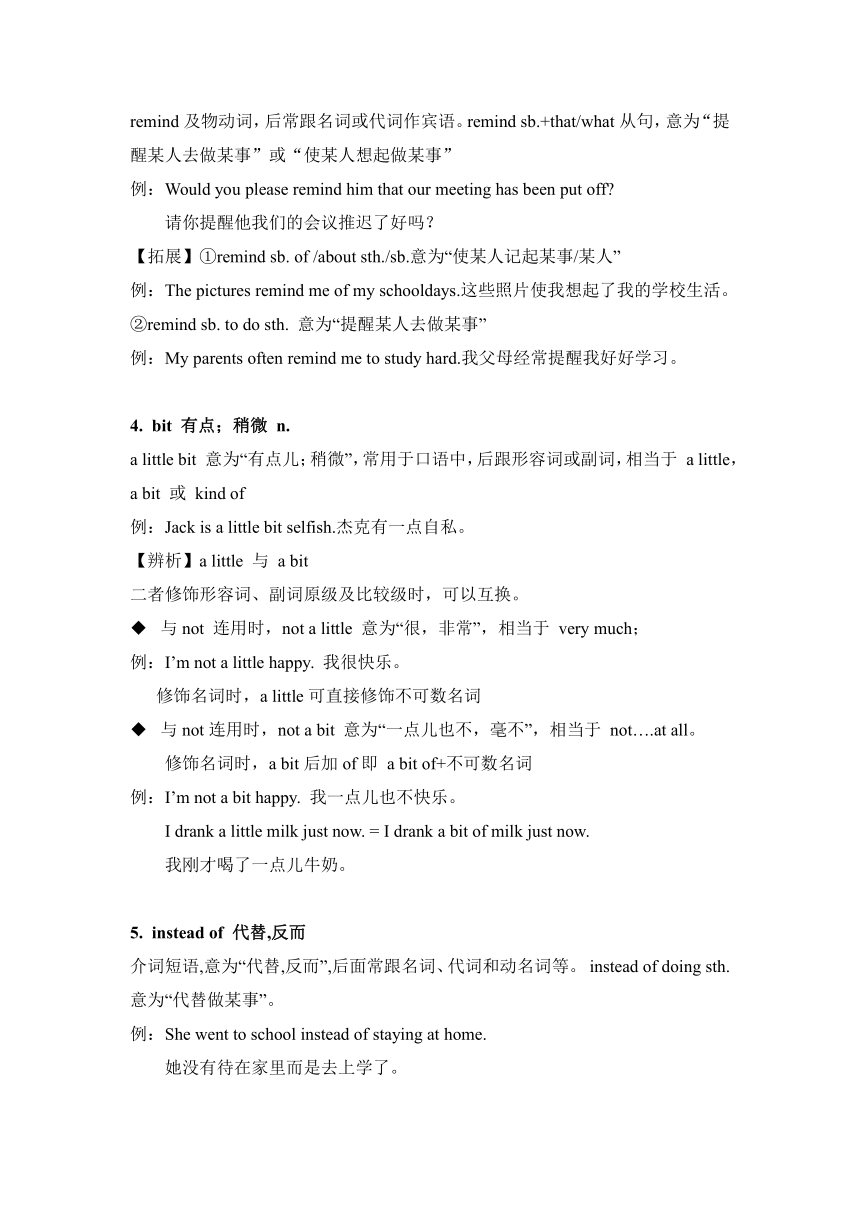
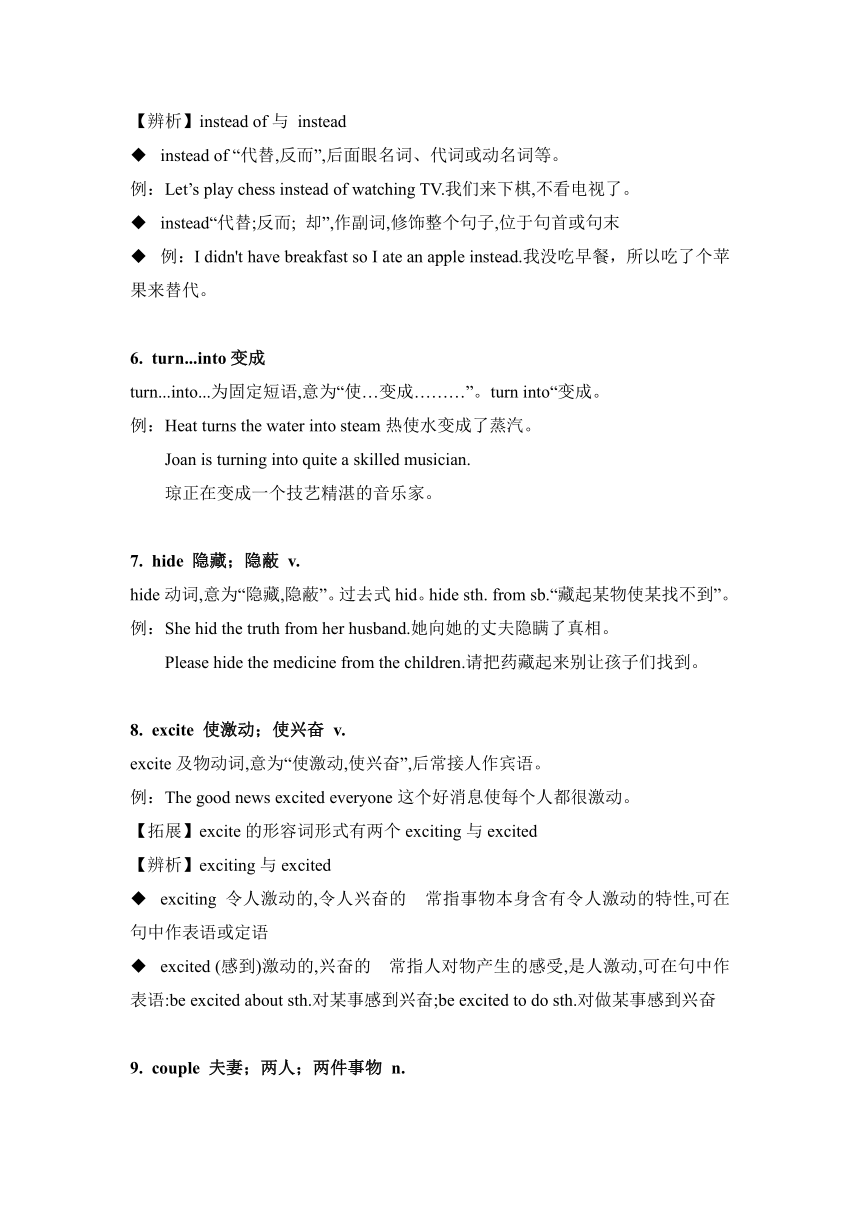
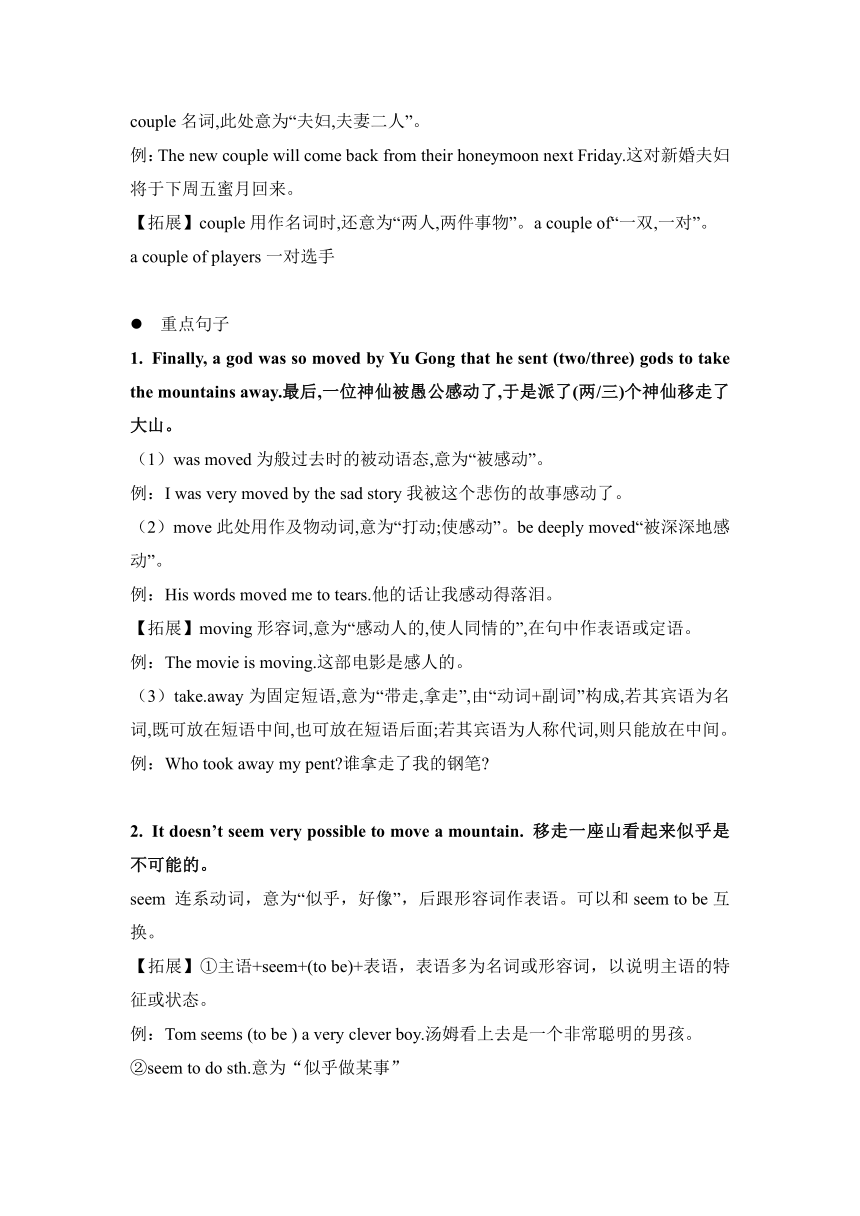
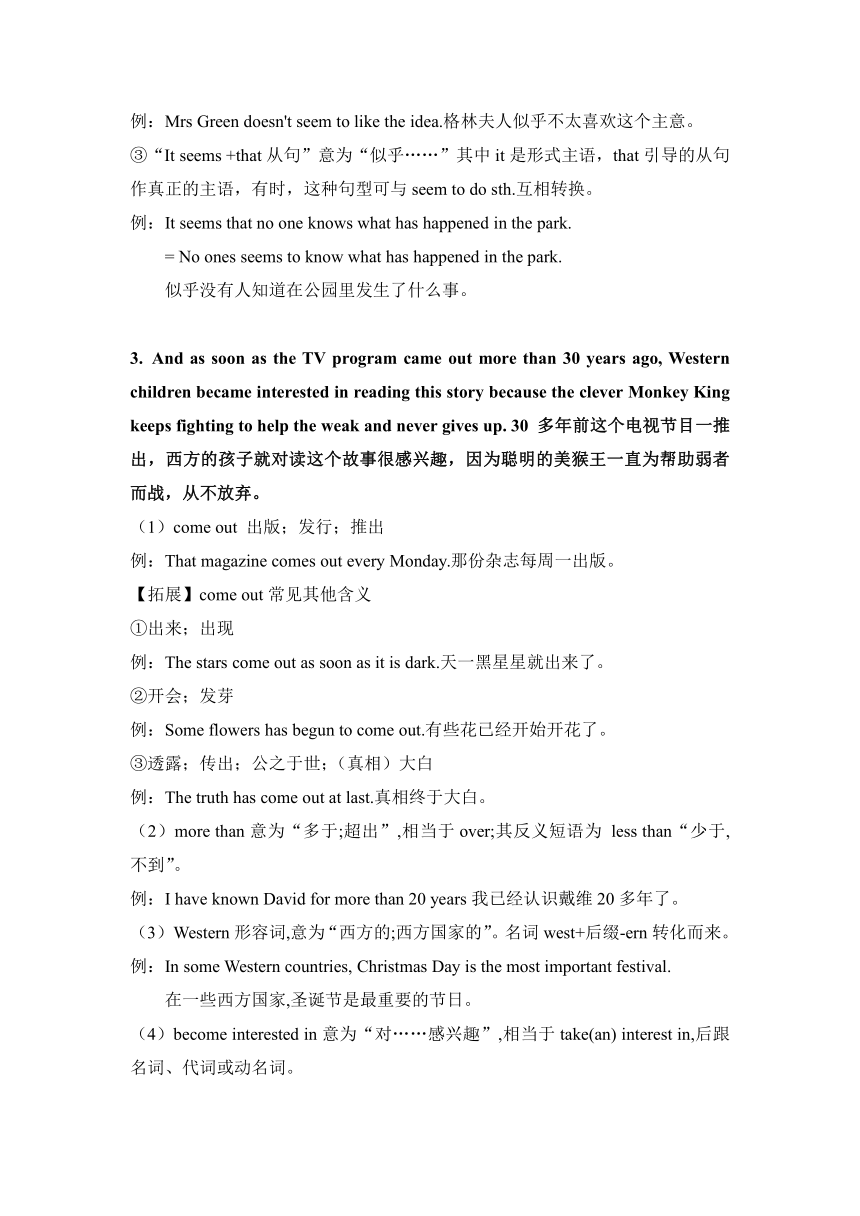
文档简介
Unit 4 An old man tried to move the mountains.
Section A
重点单词及短语
shoot射击;发射 v.
shoot及物动词,过去式为shot,现在分词为shooting
例:He shot a bird.他射中了一只鸟。
【辨析】shoot与shoot at
shoot “击中;射中;射死”,即击中目标,强调射击的结果。shoot为及物动词
例:Hands up!I’ll shoot anybody who moves.举起手来!谁动我就打死谁。
shoot at 朝某人或某物射击,不强调是否射中,而强调射击的动作。shoot为不及物动词
例: My father shot at a bird, but he didn’t shoot it.
我爸爸朝一只鸟射击,但是他没有射中。
weak 虚弱的;无力的 adj.
weak 的反义词为 strong,意为“强壮的”。
例:I still feel a bit weak after my illness.我生病痊愈后还是感觉有点虚弱。
【拓展】
①定冠词 the 与weak 连用,表示“弱者;弱势群体”,相当于 the weak people。 英语中“the + 形容词”是一种语言结构,表示“某一类人”。
例:We should help the weak.我们应该帮助弱势群体。
②weak形容词,还意为“差的;淡薄的,薄弱的”
be weak in...“在……方面差”
例:He is weak in pronunciation.他发音差。
remind 提醒;使想起 v.
remind及物动词,后常跟名词或代词作宾语。remind sb.+that/what从句,意为“提醒某人去做某事”或“使某人想起做某事”
例:Would you please remind him that our meeting has been put off
请你提醒他我们的会议推迟了好吗?
【拓展】①remind sb. of /about sth./sb.意为“使某人记起某事/某人”
例:The pictures remind me of my schooldays.这些照片使我想起了我的学校生活。
②remind sb. to do sth. 意为“提醒某人去做某事”
例:My parents often remind me to study hard.我父母经常提醒我好好学习。
bit 有点;稍微 n.
a little bit 意为“有点儿;稍微”,常用于口语中,后跟形容词或副词,相当于 a little,a bit 或 kind of
例:Jack is a little bit selfish.杰克有一点自私。
【辨析】a little 与 a bit
二者修饰形容词、副词原级及比较级时,可以互换。
与not 连用时,not a little 意为“很,非常”,相当于 very much;
例:I’m not a little happy. 我很快乐。
修饰名词时,a little可直接修饰不可数名词
与not连用时,not a bit 意为“一点儿也不,毫不”,相当于 not….at all。
修饰名词时,a bit后加of即 a bit of+不可数名词
例:I’m not a bit happy. 我一点儿也不快乐。
I drank a little milk just now. = I drank a bit of milk just now.
我刚才喝了一点儿牛奶。
instead of 代替,反而
介词短语,意为“代替,反而”,后面常跟名词、代词和动名词等。 instead of doing sth.意为“代替做某事”。
例:She went to school instead of staying at home.
她没有待在家里而是去上学了。
【辨析】instead of与 instead
instead of “代替,反而”,后面眼名词、代词或动名词等。
例:Let’s play chess instead of watching TV.我们来下棋,不看电视了。
instead“代替;反而; 却”,作副词,修饰整个句子,位于句首或句末
例:I didn't have breakfast so I ate an apple instead.我没吃早餐,所以吃了个苹果来替代。
turn...into变成
turn...into...为固定短语,意为“使…变成………”。turn into“变成。
例:Heat turns the water into steam热使水变成了蒸汽。
Joan is turning into quite a skilled musician.
琼正在变成一个技艺精湛的音乐家。
hide 隐藏;隐蔽 v.
hide动词,意为“隐藏,隐蔽”。过去式hid。hide sth. from sb.“藏起某物使某找不到”。例:She hid the truth from her husband.她向她的丈夫隐瞒了真相。
Please hide the medicine from the children.请把药藏起来别让孩子们找到。
excite 使激动;使兴奋 v.
excite及物动词,意为“使激动,使兴奋”,后常接人作宾语。
例:The good news excited everyone这个好消息使每个人都很激动。
【拓展】excite的形容词形式有两个exciting与excited
【辨析】exciting与excited
exciting 令人激动的,令人兴奋的 常指事物本身含有令人激动的特性,可在句中作表语或定语
excited (感到)激动的,兴奋的 常指人对物产生的感受,是人激动,可在句中作表语:be excited about sth.对某事感到兴奋;be excited to do sth.对做某事感到兴奋
couple 夫妻;两人;两件事物 n.
couple名词,此处意为“夫妇,夫妻二人”。
例:The new couple will come back from their honeymoon next Friday.这对新婚夫妇将于下周五蜜月回来。
【拓展】couple用作名词时,还意为“两人,两件事物”。a couple of“一双,一对”。
a couple of players一对选手
重点句子
Finally, a god was so moved by Yu Gong that he sent (two/three) gods to take the mountains away.最后,一位神仙被愚公感动了,于是派了(两/三)个神仙移走了大山。
was moved为般过去时的被动语态,意为“被感动”。
例:I was very moved by the sad story我被这个悲伤的故事感动了。
move此处用作及物动词,意为“打动;使感动”。be deeply moved“被深深地感动”。
例:His words moved me to tears.他的话让我感动得落泪。
【拓展】moving形容词,意为“感动人的,使人同情的”,在句中作表语或定语。
例:The movie is moving.这部电影是感人的。
(3)take.away为固定短语,意为“带走,拿走”,由“动词+副词”构成,若其宾语为名词,既可放在短语中间,也可放在短语后面;若其宾语为人称代词,则只能放在中间。
例:Who took away my pent 谁拿走了我的钢笔
It doesn’t seem very possible to move a mountain. 移走一座山看起来似乎是不可能的。
seem 连系动词,意为“似乎,好像”,后跟形容词作表语。可以和seem to be互换。
【拓展】①主语+seem+(to be)+表语,表语多为名词或形容词,以说明主语的特征或状态。
例:Tom seems (to be ) a very clever boy.汤姆看上去是一个非常聪明的男孩。
②seem to do sth.意为“似乎做某事”
例:Mrs Green doesn't seem to like the idea.格林夫人似乎不太喜欢这个主意。
③“It seems +that从句”意为“似乎……”其中it是形式主语,that引导的从句作真正的主语,有时,这种句型可与seem to do sth.互相转换。
例:It seems that no one knows what has happened in the park.
= No ones seems to know what has happened in the park.
似乎没有人知道在公园里发生了什么事。
And as soon as the TV program came out more than 30 years ago, Western children became interested in reading this story because the clever Monkey King keeps fighting to help the weak and never gives up. 30 多年前这个电视节目一推出,西方的孩子就对读这个故事很感兴趣,因为聪明的美猴王一直为帮助弱者而战,从不放弃。
(1)come out 出版;发行;推出
例:That magazine comes out every Monday.那份杂志每周一出版。
【拓展】come out常见其他含义
①出来;出现
例:The stars come out as soon as it is dark.天一黑星星就出来了。
②开会;发芽
例:Some flowers has begun to come out.有些花已经开始开花了。
③透露;传出;公之于世;(真相)大白
例:The truth has come out at last.真相终于大白。
(2)more than意为“多于;超出”,相当于over;其反义短语为 less than“少于,不到”。
例:I have known David for more than 20 years我已经认识戴维20多年了。
Western形容词,意为“西方的;西方国家的”。名词west+后缀-ern转化而来。
例:In some Western countries, Christmas Day is the most important festival.
在一些西方国家,圣诞节是最重要的节日。
become interested in意为“对……感兴趣”,相当于take(an) interest in,后跟名词、代词或动名词。
例:I became interested in the piano.我对钢琴感兴趣。
Because they were so big that it took a long time to walk to the other side.因为它们如此大,以至于走到另一边要花很长时间。
It takes/took (sb.) some time to do sth.“花费(某人)多少时间做某事”。take此处作及物动词,意为“花费”。
例:It took him two hours to finish the work完成这项工作花费了他2个小时。
The new couple were so happy that they couldn’t stop smiling when they got married. 这对新婚夫妇很高兴,以至于当他们结婚的时候,他们止不住地笑。
can' t stop doing sth.意为“禁不住做某事”。
例:The children couldn't stop opening the presents孩子们禁不住打开了礼物。
(2)get married意为“结婚”"。 get married to sb.意为“与某人结婚
例:He wants to get married to a teacher他想和一位老师结婚。
【拓展】① marry sb.意为“嫁给某人,娶某人,与某人结婚
例:Mr White is going to marry an actress怀特先生将与一个女演员结婚。
② marry sb. to sb.意为“(父母把女儿)嫁给某人”或“(父母为儿子)娶媳妇
例:She wants to marry her son to a rich woman她想为儿子娶个有钱的女人。
Section B
重点单词及短语
whole 全部的;整体的 adj.
whole形容词,意为“全部的;整体的”,常用结构为“限定词+ whole+名词”。
例:He worked the whole night.他工作了整整一个晚上。
【辨析】 whole与all
whole 常修饰单数可数名词 位于冠词、物主代词或所有格等限定词之后
例:The whole building was burning整座楼都在燃烧。
all修饰不可数名词或复数名词 位于冠词物主代词或所有格等限定词之前
例:All the children enjoyed themselves.所有的孩子都过得很快活。
lead 带路;领路 v.
lead不及物动词,过去式led。lead sb. to someplace 意为“引导某人到某地;带领某人去某地”。
例:The road leads you to the station.这条路指引你通往车站。
【拓展】
①lead sb. to do sth. 致使/诱惑某人……
例:What led you to think so?什么使你这么想呢?
②lead to(道路等)通往……;引起(结果等)
例:All roads lead to Rome.条条大路通罗马。
The heavy rain led to a flood.大雨导致洪水。
voice 声音,嗓音 n.
voice名词,意为“声音,嗓音”。
例:We talked in a low voice so that we wouldn't wake the baby up.我们小声说话以免吵醒婴儿。
【辨析】voice, sound与 noise
voice一般指人的声音,包括说话、唱歌的声音。有时可指鸟的声音或其他动物的声音
例:The girl has a beautiful voice.那女孩嗓音很美。
sound 泛指自然界的各种声音,既可指人的声音,又可指动物的声音
例:Light travels much faster than sound.光的传播速度比声音快得多。
noise为“噪音:喧闹声”,常指不悦耳、不和谐的嘈杂声
例:Don't make any noise!别吵闹!
重点句子
Nobody wanted to sound stupid.没有人想让自己听起来愚蠢。
sound此处作连系动词,意为“听起来”,其后通常跟形容词作表语。 sound like“听起来像……",后跟名词。
例:The music sounds very pleasing to the ear这音乐听起来十分悦耳。
Paris sounds like a city that I like巴黎听起来像是我喜欢的城市。
【拓展】常见“感官”类连系动词:look(看起来),feel(摸上去),smell(有……气味), taste(有……味道), sound(听起来)等,后跟形容词或"like+名词”。
例:Those oranges taste good.那些橘子尝起来不错。
What he says sounds like a good idea.他所说的听起来像是个好主意。
Gretel heard this, and Hansel made a plan to save himself and his sister.葛雷特听到了这件事,韩塞尔制订了一个计划,来拯救自己和他的妹妹。
(1)plan可数名词,意为“计划,打算”, make plans/a plan“制订计划”; make plans/a plan to do sth.“计划去做某事”。
例:We made a plan to have a picnic this Saturday这个星期六我们计划去野餐。
【拓展】plan动词,意为“计划,打算”。 plan to do sth.等于plan on doing sth.意为“计划或打算做某事”
例:I plan to plant some vegetables in the garden.我计划在花园里种一些蔬菜。
save及物动词,意为“拯救,挽救”。 save one's life“救某人的命”。
例:The old man saved the girl's life这个老人挽救了这个女孩的生命。
【拓展】save的其他含义:
①节约,节省
例:We should save the water.我们应该节约用水。
②积攒,储蓄
例:She wants to save some money to buy a computer.她想攒一些钱去买一台电脑。
③贮存,保存
例:Save and close the document.保存并关闭文档。
④(体育中)救出(射入门或可能得分)的球;救起(触地得分等)的球
例:Tom tried to save a scoring ball.汤姆尽力救起一个可能使对手得分的球。
Did you hear our stepmother planning to kill us 你听见我们的继母计划杀了我们吗?
【辨析】hear sb. doing sth.与hear sb. do sth.
hear sb. doing sth. “听到某人正在做某事”, 强调动作正在进行
例:I heard him singing when I walked past the shop.昨天我路过商店时,听见他正在唱歌。
hear sb. do sth. “听见某人做了某事”, 强调动作的过程,动作已经完成。
例:I often hear her sing in the evening.我经常听见她在晚上唱歌。
I’m dropping white stones along the way. Unless I do, we’ll be lost. 我正在沿路扔白色的石头。如果我不这样做,我们将会迷路的。
along作介词,意为“沿着”along the way 沿路
例:There are trees all along the road.沿着这条路从头到尾都有树。
【辨析】along, across 与 through
along 意为”沿着”, 指沿着一条直线在水平方向上运动。
例:I saw him walking along the road.我看见他正沿着这条路走。
across 意为”横过;穿过”,主要表示从某物的表面经过。
例:He walked across the bridge carefully.他小心地走过桥。
through 意为”通过;穿过”, 表示从某个空间或内部穿过。
例:He walked through the forest alone.他独自一人穿过森林。
(2)lost形容词,意为“丢失的;迷路的”be lost 迷路, 相当于 get lost/lose one’s way
例:I was lost on the way home.我在回家的路上迷路了。
What a long time you lost in the forest! 你们在森林里睡了这么久!
此句为 what 引导的感叹句。感叹句是表示喜、怒、哀、乐以及惊奇。惊讶等强烈感情的句子,感叹句通常由 what 或 how引导。
【辨析】what与how引导的感叹句
what What + a/an + adj. + 单数可数名词(+主语 + 谓语)!
例:What an interesting book it is!多么有趣的一本书啊!
What + adj. + 复数名词/不可数名词(+主语 + 谓语)!
例:What beautiful flowers they are!多么漂亮的花啊!
how How + adj./adv.(+ 主语 + 谓语)!
例:How careful she is!她多么细心啊!
How +主语+谓语!
例:How time flies!时光飞逝!
Maybe it was the birds.可能让鸟儿给吃了。
maybe副词,意为“也许,可能”,在句中作状语,相当于 perhaps,常位于句首。
例:Maybe she'll come this afternoon她可能今天下午来。
Maybe you put the letter in your pocket大概你把信放在衣袋里了。
【拓展】① may be意为“也许是,可能是”,may是情态动词,be是动词原形,两者构成完整的谓语形式,与主语形成主系表结构。
例:I can't find my watch. It may be on your desk我找不到我的手表了,它可能在你的桌子上。
② maybe和 may be可相互转换。
例:He may be in the office.= Maybe he is in the office.他或许在办公室。
It’s leading us to that wonderful house made of bread, cake and candy. 它在把我们带向那座由面包、蛋糕和糖果做成的美妙的房子。
be made of... 由……制成。此处过去分词短语made of…作 house的后置定语,表示被动。
例:The chair is made of wood这把椅子是木头做的。
【辨析】be made of 与be made from
be made of “由……制成”,指从制成品上能够看出原材料,或制作过程中发生的是物理变化
例:The table is made of wood.这张桌子是由木头制成的。
be made from “由……制成”,一般指从制成品上看不出原材料,或发生的是化学变化
例:The paper is made from wood.纸是由木头制成的。
【拓展】① be made in.意为“产于……”,后接表示地点的名词。
例:This TV set is made in Shanghai.这台电视机是上海制造的。
② be made into.意为“被制成……"。
例:This piece of wood will be made into a small bench.
这块木头将要被制成一个小凳。
③ be made up of.意为“由……构成”,后跟组成部分。
例:Water is made up of oxygen and hydrogen.水由氧气和氢气构成。
④ be made by.意为“由……制造”,后接动作的执行者。
例:The machine is made by the workers in the factory.
这台机器是由工厂里的工人们制造的。
Section A
重点单词及短语
shoot射击;发射 v.
shoot及物动词,过去式为shot,现在分词为shooting
例:He shot a bird.他射中了一只鸟。
【辨析】shoot与shoot at
shoot “击中;射中;射死”,即击中目标,强调射击的结果。shoot为及物动词
例:Hands up!I’ll shoot anybody who moves.举起手来!谁动我就打死谁。
shoot at 朝某人或某物射击,不强调是否射中,而强调射击的动作。shoot为不及物动词
例: My father shot at a bird, but he didn’t shoot it.
我爸爸朝一只鸟射击,但是他没有射中。
weak 虚弱的;无力的 adj.
weak 的反义词为 strong,意为“强壮的”。
例:I still feel a bit weak after my illness.我生病痊愈后还是感觉有点虚弱。
【拓展】
①定冠词 the 与weak 连用,表示“弱者;弱势群体”,相当于 the weak people。 英语中“the + 形容词”是一种语言结构,表示“某一类人”。
例:We should help the weak.我们应该帮助弱势群体。
②weak形容词,还意为“差的;淡薄的,薄弱的”
be weak in...“在……方面差”
例:He is weak in pronunciation.他发音差。
remind 提醒;使想起 v.
remind及物动词,后常跟名词或代词作宾语。remind sb.+that/what从句,意为“提醒某人去做某事”或“使某人想起做某事”
例:Would you please remind him that our meeting has been put off
请你提醒他我们的会议推迟了好吗?
【拓展】①remind sb. of /about sth./sb.意为“使某人记起某事/某人”
例:The pictures remind me of my schooldays.这些照片使我想起了我的学校生活。
②remind sb. to do sth. 意为“提醒某人去做某事”
例:My parents often remind me to study hard.我父母经常提醒我好好学习。
bit 有点;稍微 n.
a little bit 意为“有点儿;稍微”,常用于口语中,后跟形容词或副词,相当于 a little,a bit 或 kind of
例:Jack is a little bit selfish.杰克有一点自私。
【辨析】a little 与 a bit
二者修饰形容词、副词原级及比较级时,可以互换。
与not 连用时,not a little 意为“很,非常”,相当于 very much;
例:I’m not a little happy. 我很快乐。
修饰名词时,a little可直接修饰不可数名词
与not连用时,not a bit 意为“一点儿也不,毫不”,相当于 not….at all。
修饰名词时,a bit后加of即 a bit of+不可数名词
例:I’m not a bit happy. 我一点儿也不快乐。
I drank a little milk just now. = I drank a bit of milk just now.
我刚才喝了一点儿牛奶。
instead of 代替,反而
介词短语,意为“代替,反而”,后面常跟名词、代词和动名词等。 instead of doing sth.意为“代替做某事”。
例:She went to school instead of staying at home.
她没有待在家里而是去上学了。
【辨析】instead of与 instead
instead of “代替,反而”,后面眼名词、代词或动名词等。
例:Let’s play chess instead of watching TV.我们来下棋,不看电视了。
instead“代替;反而; 却”,作副词,修饰整个句子,位于句首或句末
例:I didn't have breakfast so I ate an apple instead.我没吃早餐,所以吃了个苹果来替代。
turn...into变成
turn...into...为固定短语,意为“使…变成………”。turn into“变成。
例:Heat turns the water into steam热使水变成了蒸汽。
Joan is turning into quite a skilled musician.
琼正在变成一个技艺精湛的音乐家。
hide 隐藏;隐蔽 v.
hide动词,意为“隐藏,隐蔽”。过去式hid。hide sth. from sb.“藏起某物使某找不到”。例:She hid the truth from her husband.她向她的丈夫隐瞒了真相。
Please hide the medicine from the children.请把药藏起来别让孩子们找到。
excite 使激动;使兴奋 v.
excite及物动词,意为“使激动,使兴奋”,后常接人作宾语。
例:The good news excited everyone这个好消息使每个人都很激动。
【拓展】excite的形容词形式有两个exciting与excited
【辨析】exciting与excited
exciting 令人激动的,令人兴奋的 常指事物本身含有令人激动的特性,可在句中作表语或定语
excited (感到)激动的,兴奋的 常指人对物产生的感受,是人激动,可在句中作表语:be excited about sth.对某事感到兴奋;be excited to do sth.对做某事感到兴奋
couple 夫妻;两人;两件事物 n.
couple名词,此处意为“夫妇,夫妻二人”。
例:The new couple will come back from their honeymoon next Friday.这对新婚夫妇将于下周五蜜月回来。
【拓展】couple用作名词时,还意为“两人,两件事物”。a couple of“一双,一对”。
a couple of players一对选手
重点句子
Finally, a god was so moved by Yu Gong that he sent (two/three) gods to take the mountains away.最后,一位神仙被愚公感动了,于是派了(两/三)个神仙移走了大山。
was moved为般过去时的被动语态,意为“被感动”。
例:I was very moved by the sad story我被这个悲伤的故事感动了。
move此处用作及物动词,意为“打动;使感动”。be deeply moved“被深深地感动”。
例:His words moved me to tears.他的话让我感动得落泪。
【拓展】moving形容词,意为“感动人的,使人同情的”,在句中作表语或定语。
例:The movie is moving.这部电影是感人的。
(3)take.away为固定短语,意为“带走,拿走”,由“动词+副词”构成,若其宾语为名词,既可放在短语中间,也可放在短语后面;若其宾语为人称代词,则只能放在中间。
例:Who took away my pent 谁拿走了我的钢笔
It doesn’t seem very possible to move a mountain. 移走一座山看起来似乎是不可能的。
seem 连系动词,意为“似乎,好像”,后跟形容词作表语。可以和seem to be互换。
【拓展】①主语+seem+(to be)+表语,表语多为名词或形容词,以说明主语的特征或状态。
例:Tom seems (to be ) a very clever boy.汤姆看上去是一个非常聪明的男孩。
②seem to do sth.意为“似乎做某事”
例:Mrs Green doesn't seem to like the idea.格林夫人似乎不太喜欢这个主意。
③“It seems +that从句”意为“似乎……”其中it是形式主语,that引导的从句作真正的主语,有时,这种句型可与seem to do sth.互相转换。
例:It seems that no one knows what has happened in the park.
= No ones seems to know what has happened in the park.
似乎没有人知道在公园里发生了什么事。
And as soon as the TV program came out more than 30 years ago, Western children became interested in reading this story because the clever Monkey King keeps fighting to help the weak and never gives up. 30 多年前这个电视节目一推出,西方的孩子就对读这个故事很感兴趣,因为聪明的美猴王一直为帮助弱者而战,从不放弃。
(1)come out 出版;发行;推出
例:That magazine comes out every Monday.那份杂志每周一出版。
【拓展】come out常见其他含义
①出来;出现
例:The stars come out as soon as it is dark.天一黑星星就出来了。
②开会;发芽
例:Some flowers has begun to come out.有些花已经开始开花了。
③透露;传出;公之于世;(真相)大白
例:The truth has come out at last.真相终于大白。
(2)more than意为“多于;超出”,相当于over;其反义短语为 less than“少于,不到”。
例:I have known David for more than 20 years我已经认识戴维20多年了。
Western形容词,意为“西方的;西方国家的”。名词west+后缀-ern转化而来。
例:In some Western countries, Christmas Day is the most important festival.
在一些西方国家,圣诞节是最重要的节日。
become interested in意为“对……感兴趣”,相当于take(an) interest in,后跟名词、代词或动名词。
例:I became interested in the piano.我对钢琴感兴趣。
Because they were so big that it took a long time to walk to the other side.因为它们如此大,以至于走到另一边要花很长时间。
It takes/took (sb.) some time to do sth.“花费(某人)多少时间做某事”。take此处作及物动词,意为“花费”。
例:It took him two hours to finish the work完成这项工作花费了他2个小时。
The new couple were so happy that they couldn’t stop smiling when they got married. 这对新婚夫妇很高兴,以至于当他们结婚的时候,他们止不住地笑。
can' t stop doing sth.意为“禁不住做某事”。
例:The children couldn't stop opening the presents孩子们禁不住打开了礼物。
(2)get married意为“结婚”"。 get married to sb.意为“与某人结婚
例:He wants to get married to a teacher他想和一位老师结婚。
【拓展】① marry sb.意为“嫁给某人,娶某人,与某人结婚
例:Mr White is going to marry an actress怀特先生将与一个女演员结婚。
② marry sb. to sb.意为“(父母把女儿)嫁给某人”或“(父母为儿子)娶媳妇
例:She wants to marry her son to a rich woman她想为儿子娶个有钱的女人。
Section B
重点单词及短语
whole 全部的;整体的 adj.
whole形容词,意为“全部的;整体的”,常用结构为“限定词+ whole+名词”。
例:He worked the whole night.他工作了整整一个晚上。
【辨析】 whole与all
whole 常修饰单数可数名词 位于冠词、物主代词或所有格等限定词之后
例:The whole building was burning整座楼都在燃烧。
all修饰不可数名词或复数名词 位于冠词物主代词或所有格等限定词之前
例:All the children enjoyed themselves.所有的孩子都过得很快活。
lead 带路;领路 v.
lead不及物动词,过去式led。lead sb. to someplace 意为“引导某人到某地;带领某人去某地”。
例:The road leads you to the station.这条路指引你通往车站。
【拓展】
①lead sb. to do sth. 致使/诱惑某人……
例:What led you to think so?什么使你这么想呢?
②lead to(道路等)通往……;引起(结果等)
例:All roads lead to Rome.条条大路通罗马。
The heavy rain led to a flood.大雨导致洪水。
voice 声音,嗓音 n.
voice名词,意为“声音,嗓音”。
例:We talked in a low voice so that we wouldn't wake the baby up.我们小声说话以免吵醒婴儿。
【辨析】voice, sound与 noise
voice一般指人的声音,包括说话、唱歌的声音。有时可指鸟的声音或其他动物的声音
例:The girl has a beautiful voice.那女孩嗓音很美。
sound 泛指自然界的各种声音,既可指人的声音,又可指动物的声音
例:Light travels much faster than sound.光的传播速度比声音快得多。
noise为“噪音:喧闹声”,常指不悦耳、不和谐的嘈杂声
例:Don't make any noise!别吵闹!
重点句子
Nobody wanted to sound stupid.没有人想让自己听起来愚蠢。
sound此处作连系动词,意为“听起来”,其后通常跟形容词作表语。 sound like“听起来像……",后跟名词。
例:The music sounds very pleasing to the ear这音乐听起来十分悦耳。
Paris sounds like a city that I like巴黎听起来像是我喜欢的城市。
【拓展】常见“感官”类连系动词:look(看起来),feel(摸上去),smell(有……气味), taste(有……味道), sound(听起来)等,后跟形容词或"like+名词”。
例:Those oranges taste good.那些橘子尝起来不错。
What he says sounds like a good idea.他所说的听起来像是个好主意。
Gretel heard this, and Hansel made a plan to save himself and his sister.葛雷特听到了这件事,韩塞尔制订了一个计划,来拯救自己和他的妹妹。
(1)plan可数名词,意为“计划,打算”, make plans/a plan“制订计划”; make plans/a plan to do sth.“计划去做某事”。
例:We made a plan to have a picnic this Saturday这个星期六我们计划去野餐。
【拓展】plan动词,意为“计划,打算”。 plan to do sth.等于plan on doing sth.意为“计划或打算做某事”
例:I plan to plant some vegetables in the garden.我计划在花园里种一些蔬菜。
save及物动词,意为“拯救,挽救”。 save one's life“救某人的命”。
例:The old man saved the girl's life这个老人挽救了这个女孩的生命。
【拓展】save的其他含义:
①节约,节省
例:We should save the water.我们应该节约用水。
②积攒,储蓄
例:She wants to save some money to buy a computer.她想攒一些钱去买一台电脑。
③贮存,保存
例:Save and close the document.保存并关闭文档。
④(体育中)救出(射入门或可能得分)的球;救起(触地得分等)的球
例:Tom tried to save a scoring ball.汤姆尽力救起一个可能使对手得分的球。
Did you hear our stepmother planning to kill us 你听见我们的继母计划杀了我们吗?
【辨析】hear sb. doing sth.与hear sb. do sth.
hear sb. doing sth. “听到某人正在做某事”, 强调动作正在进行
例:I heard him singing when I walked past the shop.昨天我路过商店时,听见他正在唱歌。
hear sb. do sth. “听见某人做了某事”, 强调动作的过程,动作已经完成。
例:I often hear her sing in the evening.我经常听见她在晚上唱歌。
I’m dropping white stones along the way. Unless I do, we’ll be lost. 我正在沿路扔白色的石头。如果我不这样做,我们将会迷路的。
along作介词,意为“沿着”along the way 沿路
例:There are trees all along the road.沿着这条路从头到尾都有树。
【辨析】along, across 与 through
along 意为”沿着”, 指沿着一条直线在水平方向上运动。
例:I saw him walking along the road.我看见他正沿着这条路走。
across 意为”横过;穿过”,主要表示从某物的表面经过。
例:He walked across the bridge carefully.他小心地走过桥。
through 意为”通过;穿过”, 表示从某个空间或内部穿过。
例:He walked through the forest alone.他独自一人穿过森林。
(2)lost形容词,意为“丢失的;迷路的”be lost 迷路, 相当于 get lost/lose one’s way
例:I was lost on the way home.我在回家的路上迷路了。
What a long time you lost in the forest! 你们在森林里睡了这么久!
此句为 what 引导的感叹句。感叹句是表示喜、怒、哀、乐以及惊奇。惊讶等强烈感情的句子,感叹句通常由 what 或 how引导。
【辨析】what与how引导的感叹句
what What + a/an + adj. + 单数可数名词(+主语 + 谓语)!
例:What an interesting book it is!多么有趣的一本书啊!
What + adj. + 复数名词/不可数名词(+主语 + 谓语)!
例:What beautiful flowers they are!多么漂亮的花啊!
how How + adj./adv.(+ 主语 + 谓语)!
例:How careful she is!她多么细心啊!
How +主语+谓语!
例:How time flies!时光飞逝!
Maybe it was the birds.可能让鸟儿给吃了。
maybe副词,意为“也许,可能”,在句中作状语,相当于 perhaps,常位于句首。
例:Maybe she'll come this afternoon她可能今天下午来。
Maybe you put the letter in your pocket大概你把信放在衣袋里了。
【拓展】① may be意为“也许是,可能是”,may是情态动词,be是动词原形,两者构成完整的谓语形式,与主语形成主系表结构。
例:I can't find my watch. It may be on your desk我找不到我的手表了,它可能在你的桌子上。
② maybe和 may be可相互转换。
例:He may be in the office.= Maybe he is in the office.他或许在办公室。
It’s leading us to that wonderful house made of bread, cake and candy. 它在把我们带向那座由面包、蛋糕和糖果做成的美妙的房子。
be made of... 由……制成。此处过去分词短语made of…作 house的后置定语,表示被动。
例:The chair is made of wood这把椅子是木头做的。
【辨析】be made of 与be made from
be made of “由……制成”,指从制成品上能够看出原材料,或制作过程中发生的是物理变化
例:The table is made of wood.这张桌子是由木头制成的。
be made from “由……制成”,一般指从制成品上看不出原材料,或发生的是化学变化
例:The paper is made from wood.纸是由木头制成的。
【拓展】① be made in.意为“产于……”,后接表示地点的名词。
例:This TV set is made in Shanghai.这台电视机是上海制造的。
② be made into.意为“被制成……"。
例:This piece of wood will be made into a small bench.
这块木头将要被制成一个小凳。
③ be made up of.意为“由……构成”,后跟组成部分。
例:Water is made up of oxygen and hydrogen.水由氧气和氢气构成。
④ be made by.意为“由……制造”,后接动作的执行者。
例:The machine is made by the workers in the factory.
这台机器是由工厂里的工人们制造的。
同课章节目录
- Unit 1 Could you please clean your room?
- Section A
- Section B
- Unit 2 Why don't you talk to your parents?
- Section A
- Section B
- Unit 3 What were you doing when the rainstorm came
- Section A
- Section B
- Unit 4 An old man tried to move the mountains.
- Section A
- Section B
- Unit 5 What's the highest mountain in the world?
- Section A
- Section B
- Unit 6 Have you read Treasure Island yet?
- Section A
- Section B
- Unit 7 Have you ever been to a museum?
- Section A
- Section B
- Unit 8 I've had this bike for three years.
- Section A
- Section B
